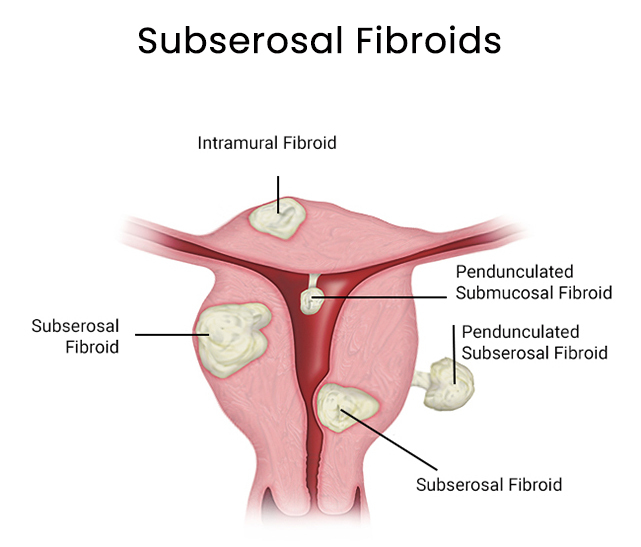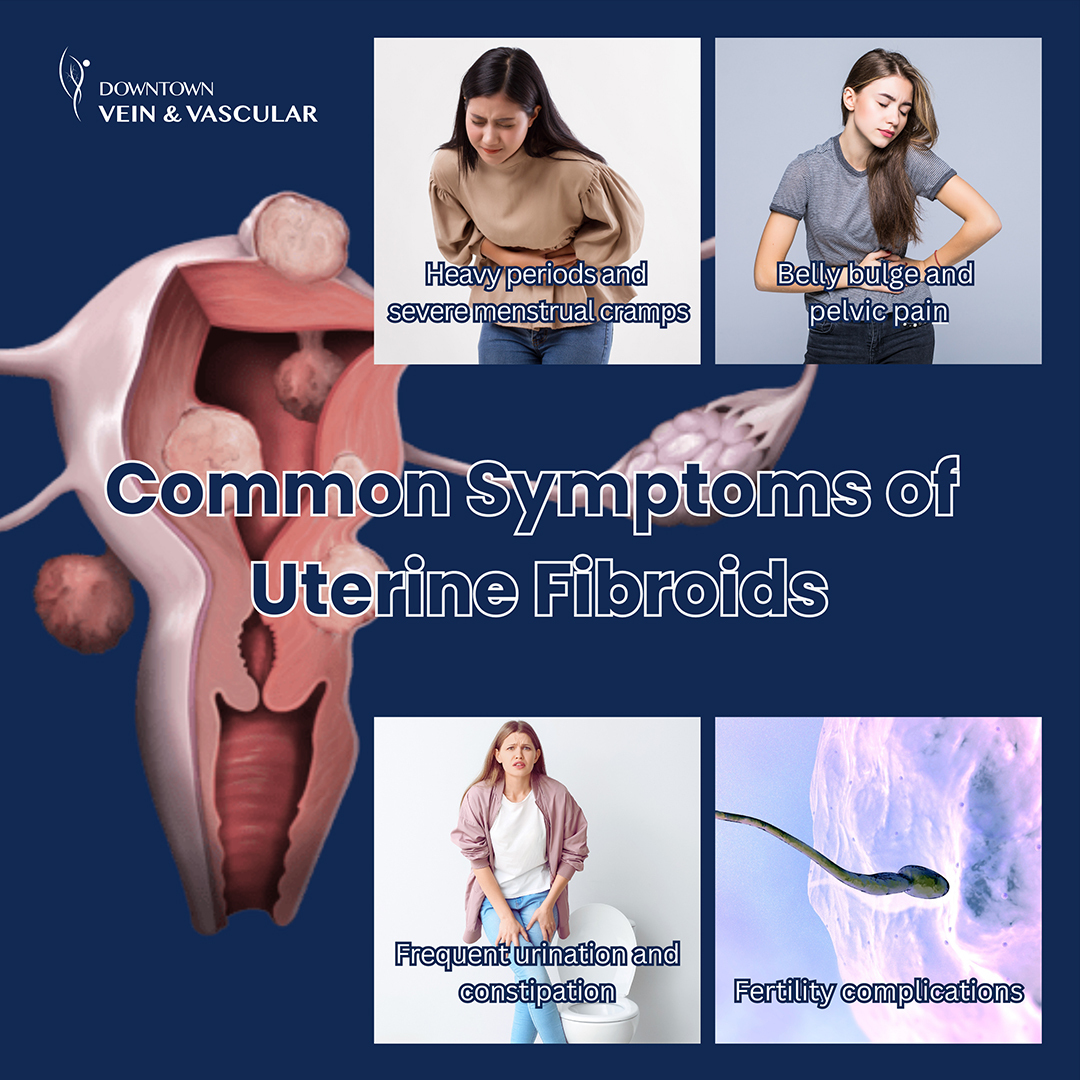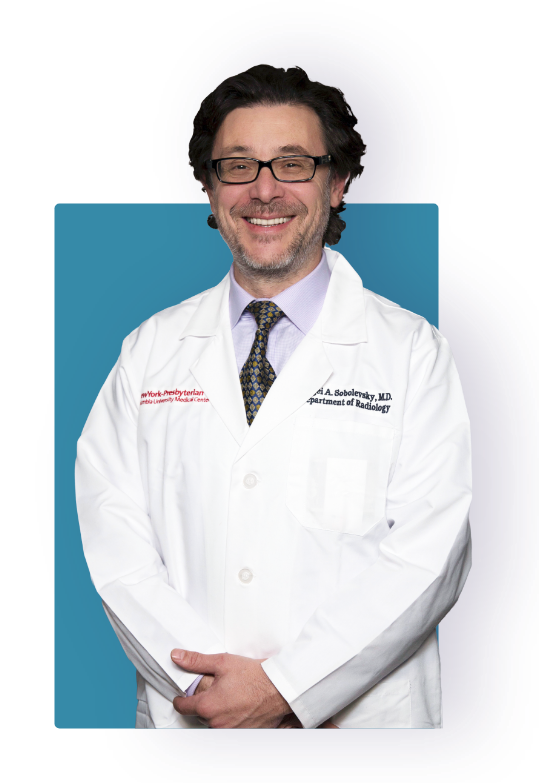Women may become so accustomed to pain because of their monthly menstrual cycle that they may not realize they have a treatable underlying cause, such as a uterine fibroid or adenomyosis. Fibroid pain may appear only during your period, or it can cause severe discomfort throughout the month, when you have sex or just periodically. Once you’ve been diagnosed with pain due to fibroids or adenomyosis, however, there is an effective treatment available at this Downtown Brooklyn facility. Call the Downtown Vein & Vascular Center for the best uterine fibroid pain treatment.
What Are Fibroids?
Fibroids — also called uterine fibroids, leiomyomas or myomas — are growths that occur in and on your uterus. The size, number and growth rate of fibroids vary from case to case. About 75 to 80 percent of women are diagnosed with fibroids in their lifetime. Fibroids are non-cancerous.
Pain due to fibroids is common. These tumors may also cause increased pressure on other organs, leading to pelvic discomfort or excessive bleeding. Fibroid pain relief and uterine fibroid pain treatment is available at the Downtown Vein & Vascular Center in Brooklyn, NY. Dr. Sergei Sobolevsky and his experienced, compassionate team provide comprehensive uterine fibroid pain treatment.
What Are Common Symptoms of Fibroids?
There are three main types of fibroids, based on where they grow. Fibroids that appear on the outside of the uterus are called sub serosal fibroids, whereas fibroids that grow adjacent to the interior lining are called submucosal fibroids. Intramural fibroids are those that grow inside the uterine muscle. The symptoms you experience may vary, depending on the type of fibroids you have.
The three types include:
- Subserosal fibroids tend to cause pelvic pain and uncomfortable pressure on other organs.
- Submucosal fibroids are more likely to cause bleeding and affect your menstrual cycle.
- Intramural fibroids tend to cause pelvic pain and heaviness

Pain and menstrual bleeding are the most common symptoms of fibroids, as well as adenomyosis. But you may have fibroids but show no symptoms. Depending on the size of your fibroids, the number of them and their location, your symptoms may vary.
Common symptoms of uterine fibroids include:
- Heavy periods and severe menstrual cramps. Changes in your menstrual cycle may be an indication that you have fibroids. Spotting or even heavy bleeding between menstrual cycles, may also occur. Cramps that cause extreme discomfort may indicate the presence of fibroids.
- Belly bulge and pelvic pain. As fibroids grow, your uterus swells. An enlarged uterus caused by fibroids — also known as belly bulge — may look similar to abdominal bloating or even early stages of pregnancy. This swelling often leads to localized pelvic pain as well as pain during sex. Weight gain is another consequence of a swollen uterus due to fibroids.
- Frequent urination and constipation. Fibroids can negatively affect your urinary and digestive systems. When your uterus swells, it exerts pressure on nearby organs. You may experience frequent urination from pressure on your bladder. Constipation or hemorrhoids may be due to pressure on your large bowel.
- Fertility complications. It’s rare for fibroids to interfere with fertility, but in some cases, fibroids cause loss of pregnancy or infertility, especially in the second and third trimester. These risks are higher with submucosal fibroids that grow within the uterine lining.

Uterine fibroid pain can also manifest in other areas of your body. You may experience lower back pain when large fibroids apply pressure to the nerves and muscles in that area. Additionally, pain from pressure to these nerves can spread to your legs. If your fibroids lead to anemia, you may also experience headaches, fatigue or lightheadedness.
★ ★ ★ ★ ★
Professional and Caring
Dr. Sobolevsky was both professional and caring during my vein treatment. He made me feel comfortable throughout the process and provided excellent care. I’m grateful for his expertise and would highly recommend him to anyone seeking vein treatment.
What Are My Fibroid Pain Treatment Options?
Most people with fibroids show no symptoms. In women who do develop symptomatic uterine fibroids, the evaluation and diagnosis begin with an ultrasound or MRI. Once you’re diagnosed with symptomatic uterine fibroids, several uterine fibroid treatments are available.
Medication provides fibroid pain relief, but if your fibroid case is advanced, you may need a medical procedure or surgery. The best treatment for you depends on your overall health and the nature of your fibroids.
Common fibroid treatments include:
- Birth control medication. Prescription birth control medications, such as oral contraceptives or intrauterine devices, may provide fibroid pain relief.
- GnRH agonists. GnRH agonists temporarily shrink the size of your fibroids and lessen heavy menstrual bleeding.
- Over-the-counter pain medication. Acetaminophen, ibuprofen and aspirin reduce pain from fibroids.
- Iron supplements. In cases where heavy menstrual cycles cause anemia, iron supplements improve your energy levels.
- Uterine fibroid embolization. Uterine fibroid embolization is a non-surgical procedure that limits blood flow to the uterus, causing the fibroids to shrink. This treatment also works to counter adenomyosis symptoms.
- A myomectomy or hysterectomy. A myomectomy surgically removes just the fibroids, while a hysterectomy removes your entire uterus. A hysterectomy is the most effective treatment against fibroid pain, but it is a major surgery and it results in absolute infertility.
While medications provide some fibroid pain relief, they do not eliminate the fibroids themselves. Uterine fibroid embolization or surgery are effective types of fibroid pain treatments that remove fibroids from your body. Contact the Downtown Vein & Vascular Center to set up a consultation for fibroid pain relief today. It’s New York’s trusted source of comprehensive uterine fibroid pain treatment.

I am Dr. Sergei Sobolevsky, a leading specialist in endovascular medicine. Having performed over 25,000 procedures throughout my career, I bring decades of experience in vascular and interventional radiology to my practice. I obtained my Doctor of Medicine (MD) degree from the University of Colorado School of Medicine in 1997 and completed my specialty clinical training in vascular and interventional radiology at Harvard University.
My dedication to excellence in patient care has been recognized through accolades such as being named a Castle Connolly Top Doctor and inclusion in the Top Doctors New York Metro Area lists for 2020, 2021, 2022, and 2023. With licenses in multiple states, I have also shared my expertise through presentations at various institutions in the US and abroad.
More About Dr. SobolevskyDowntown Vein Treatment Center
480 Court Street, Ste 101
Brooklyn, NY 11231
(718) 787-5559


